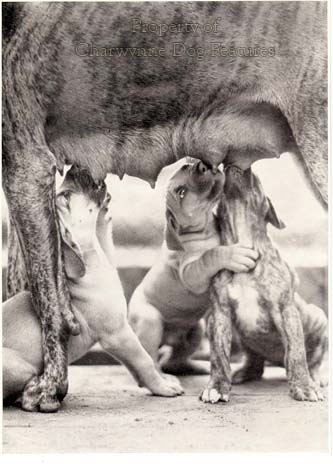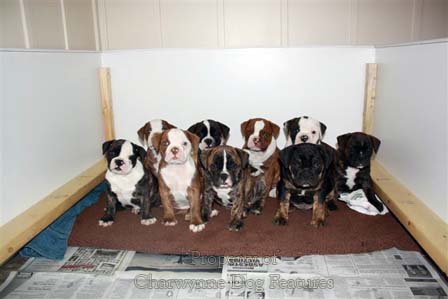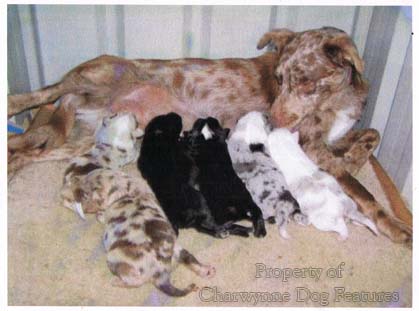451 Breeding Responsibly
BREEDING RESPONSIBLY
by David Hancock
 A decade ago, a retriever breeder handed over 160 dogs to the RSPCA but retained around 40 bitches, for breeding. Just how many litters have these 40 produced and how many has the KC registered since then? It is quite clear to me that far too many pedigree dog breeders are overproducing, breeding too many pups. Good news for the Kennel Club's bank balance, not good news for the breeds concerned, bad news for those seeking responsible dog breeding and very bad news indeed for the hard-pressed rescue organisations. In my view, it should not be easy to buy a pedigree puppy, otherwise the purchase is not valued, not made special, degraded in fact.
A decade ago, a retriever breeder handed over 160 dogs to the RSPCA but retained around 40 bitches, for breeding. Just how many litters have these 40 produced and how many has the KC registered since then? It is quite clear to me that far too many pedigree dog breeders are overproducing, breeding too many pups. Good news for the Kennel Club's bank balance, not good news for the breeds concerned, bad news for those seeking responsible dog breeding and very bad news indeed for the hard-pressed rescue organisations. In my view, it should not be easy to buy a pedigree puppy, otherwise the purchase is not valued, not made special, degraded in fact.
What do breed correspondents have to say about such matters? Here are some of their comments in recent years: Pembrokeshire Welsh corgis -- "...five bitches produced five litters apiece, three of whom had produced their fourth litter less than seven months previously...one was only three years eight months (old). Five litters before her fourth birthday!" Staffordshire bullterriers -- "...12 bitches having had seven litters. 1 had 10 or more litters." Airedale rescue -- "...as fast as one is rehomed others are brought to our attention." Rhodesian ridgebacks -- "The horrific fact is that too many Ridgebacks are being bred." St. Bernards -- "200 Saints had been rehomed in two years" . Dalmatians -- "..one bitch, had four litters of 33 puppies in under four years." And Weimaraners -- "The number of dogs needing to be rehoused also increases every year."
These words refer to pedigree show dog breeders not puppy farm owners. According to the KC stud books, in the ten years 1993-2003, over 350,000 Labradors, 150,000 Golden Retrievers, 50,000 Rottweilers, 180,000 German shepherd dogs and 30,000 Dobermanns were registered. Even twenty years ago over 1,500 German shepherd dogs and 650 Dobermanns were being received annually at the Battersea Dogs Home; only 330 being claimed. The home handles over 1,000 Staffies each year. Boxer rescue rehomes over 1,000 Boxers every year. I dread to think what the totals across the country's breed welfare units as a whole are. Breeding on such a scale is completely irresponsible; it is small wonder that we are being advised to go to such breeders, how else can they shift their stock! The Kennel Club runs a puppy sales register. In 1996, 92 breeders registered around 3,100 litters; two years later it was 140 breeders producing nearly 4,500 litters. That's an awful lot of stock and that is some increase.
What do reports from the magistrates' courts and the KC disciplinary hearings tell us about some of the very people we are being advised to go to for our next pup? Court cases in recent years involving pedigree dog breeders include: the starvation of 3 Borzois; causing suffering to 94 dogs; Pointer breeder on 35 counts of causing unnecessary cruelty; Akita breeder sold puppy infected with leptospirosis; 'top breeder' of Cocker Spaniels caused appalling suffering to 7 dogs; wantonly causing suffering to 34 chihuahuas, 2 Chinese crested and a Yorkie; forging hip-scores for a Labrador; causing unnecessary suffering to a Scottish terrier which had been kept in a four feet by two feet enclosure; interfering with a badger sett; breeding and selling dangerous dogs; selling mongrels as GSDs; organising dogfights and assaulting fellow exhibitors.
Or, a cynic might add, are we being advised to go to show breeders such as the one whose poodle gave birth at a show, the one whose dogs died in an overheated car at a show and the ones who have poisoned other exhibits at shows in recent years? Every group of humans contains bad elements but is it responsible advice to tell the public where to go for their next purchase, as the KC do, in the light of such cases? Instead of an all-embracing wave of approval for all breeder-exhibitors, why not build in some checks and safeguards? Every new owner of a pedigree pup, on paying to register the animal in his or her name, should be given the opportunity to comment on the condition of the breeding establishment and on how the sale was conducted. Even the manufacturer of my car does this! Are cars more important than dogs?
In America, the American Kennel Club carries out visits to breeders' premises to check on conditions there. Our KC does not. Without such safeguards, scope is being given to the uncaring and the unscrupulous, and the dishonest have a free run. I fear that one day a "Which Magazine" type of investigative report will be undertaken by a consumer protection body into the buying and selling of pedigree dogs and it will be quite devastating. That would damage and be wholly unfair to the truly responsible breeder. But who can define the latter? 
The Kennel Club does run a "Puppy Sales Register", with an information pack for prospective puppy owners "where the enquirer is seeking to contact a responsible breeder..." I think they mean any breeder who registers dogs with them -- and we know what some of those are like! The KC's Assured Breeder Scheme asks breeders to follow their policy on the number and frequency of litters and I give them full marks for that. But firstly, why should a puppy-farming breeder even contemplate signing up to such a code? And secondly, in a hard-pressed registration department, busy securing the financial basis of the club's activities, identifying over-breeding is an additional task not a primary one.
What are other countries doing? In Switzerland, a dog cannot be used for breeding unless it passes tests for conformation, temperament and health. In Finland, each breed organisation is required to compile a breeding programme covering character, health, performance and appearance. South Africa has introduced a requirement for hip dysplasia clearance for dogs of all breeds. In Sweden, a litter is registered when the parents meet specified criteria; if they do not, the litter cannot be recognised.
Colombia and Poland accept that mandatory clearances are not popular with breeders but give them no choice. Mexico, Croatia, even El Salvador and the Slovenkia Kennel Club have clearance requirements. The Canadian KC Strategic Planning Committee has looked at the possibility of establishing an advanced registry of pedigree dog breeders. This involves hip scoring, blood sampling, temperament testing, structural soundness, genetic health surveys and progeny tests. As for us, let's muddle on, producing as many litters as we can, from mediocre unhealthy dogs (how can we tell if they are not?), sometimes in quite dreadful living conditions. We will probably form a committee to ascertain over the next five years or so the precise definition of the word 'responsible'. We are now surely fast becoming a 'Third World country' in the breeding of pedigree dogs. Our precious breeds of dog deserve better.